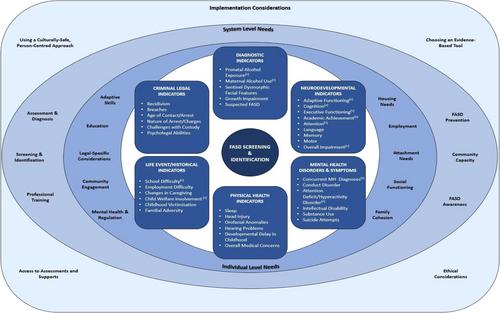Screening for fetal alcohol spectrum disorder (FASD) has been identified as a promising approach to improve recognition, understanding and effective response to the unique needs of those with FASD in criminal legal settings. However, to date, there has been limited synthesis of relevant screening tools, indicators, or implementation considerations in this context.
The present review aimed to synthesise evidence and develop a conceptual framework for understanding how, when, why, for whom and by whom FASD screening tools, items and/or indicators and characteristics serve to accurately identify people with FASD in criminal legal contexts, with consideration of individual and system needs relevant to effective implementation and response.
A preregistered search was conducted using a modified realist review framework for both peer-reviewed articles and grey literature. Included sources were available in English, which focused on individuals with prenatal alcohol exposure and/or FASD with criminal legal involvement and offered new empirical evidence. Sources were reviewed using the Quality Control Tool for Screening Titles and Abstracts by Second Reviewer framework, extracted using a structured coding form and narratively synthesised.
The search yielded 52 sources, 11 FASD screening tools designed for or applied in criminal legal settings and 38 potential FASD indicators or characteristics relevant to identifying people who may have FASD in criminal legal settings, organised into six conceptually related domains. There was limited evidence supporting the psychometric properties of screening tools across populations or settings, though growing evidence highlights the promise of some instruments. Although few studies characterised potential considerations to be made when implementing a screening tool or approach, both system and individual level needs related to recognising and effectively responding to FASD in criminal legal contexts were identified, and findings revealed strong support among legal and clinical professionals regarding the need for FASD screening in these settings.
Findings of this review can be used to inform the development, selection, implementation and evaluation of FASD screening tools in criminal legal settings and underscore a continued need for enhanced resources, policy and cross-sectoral response to better support the needs of people with FASD in the criminal legal contexts.



